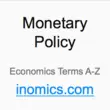-
- Economics Terms A-Z
- Posted 3 years ago
Macroeconomics
en es fr de it
-
- Economics Terms A-Z
- Posted 6 years ago
Marginal Revenue
en es fr de it
-
- Economics Terms A-Z
- Posted 5 years ago
Marginal Utility
en es fr de it
-
- Economics Terms A-Z
- Posted 6 years ago
Market Equilibrium
en es fr de it
-
- Economics Terms A-Z
- Posted 2 years ago
Market Failure

-
- Economics Terms A-Z
- Posted 3 years ago
Microeconomics
en es fr de it
-
- Economics Terms A-Z
- Posted 1 year ago
Monetary Neutrality

-
- Economics Terms A-Z
- Posted 5 years ago
Monetary Policy
en es fr de it
-
- Economics Terms A-Z
- Posted 2 years ago
Money and the Money Supply
en fr de
-
- Economics Terms A-Z
- Posted 6 years ago
Monopoly
en es fr de it
-
- Economics Terms A-Z
- Posted 4 years ago
Moral Hazard
en es de it
-
- Economics Terms A-Z
- Posted 1 year ago
Multiplier Effect














